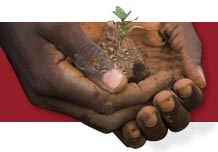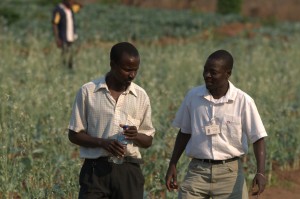What We’re Reading: The World Bank’s Africa Can…End Poverty Blog
The World Bank’s blogs cover a wide range of global economic issues. One blog titled Africa Can… End Poverty is run by Shanta Devarajan who is the Chief Economist for Africa at The World Bank. As Opportunity International continues to expand its work in Africa, including agricultural finance, mobile banking, and financial literacy training, I have highlighted three blog posts that speak to our mission and methods.
 1. “Cassava As an Income-Earning Crop for Small Farmers”
1. “Cassava As an Income-Earning Crop for Small Farmers”
This post emphasizes the importance of cassava both nutritionally and economically. According to the entry, cassava is the “second most important source of carbohydrate in Africa after maize,” and its leaves can provide protein and vitamins A and B. It also mentions the income-providing potential of cassava as a subsistence crop, but stresses that such potential “has not been widely tapped.” While Opportunity focuses on the impact that cassava farming can have on the lives of individuals and communities affected by extreme poverty, this post makes the argument that, if certain obstacles such as “post-harvest processing and regional trade barriers” are overcome, cassava is a good candidate for regional trade as well, which could improve the economies of entire countries.
2. “More Cell Phones than Toilets”
Blog contributor and World Bank economist Xiao Ye focuses on an article in The New York Times that states that more people today have access to a cell phone than to a clean toilet. Devarajan recognizes that the “deregulation of the cellular telephone sector” as a main cause behind the rapid expansion experienced resulting from large increases in investment. As is put into practice by Opportunity, it is noted that cell phones are an important tool that serve, in many cases, as forms of identification in addition to providing means of communication. The ability to “equip voters” with information about elections was also listed as an interesting way that African countries’ can experience multidimensional benefits from this technological takeover.
Aligning closely with the motivation behind Opportunity’s work, this post brings awareness to the difficulty experienced by Mozambican citizens when they try to attain loans from financial institutions. Devarajan mentions that many bankers were wary of lending to Mozambique’s entrepreneurs because the “enterprises lacked managerial and accounting skills.” This is why the services provided by Opportunity loan officers are so crucial. In aiding the extremely impoverished of Mozambique through support and financial education, in addition to expanding their businesses and helping them build collateral, it opens more doors for these people who are dedicated to changing their circumstances. As suggests the post, “financial development is crucial to economic growth,” and empowering Mozambique’s entrepreneurs is an important step in that direction.
This post was written by Deanna Giolas. Deanna recently graduated from Indiana University with Bachelor of Arts degrees in International Studies and Spanish. She concentrated her studies in human rights and social movements in Latin America, and studied abroad for a semester in Santiago, Chile, where she was inspired by the educational and indigenous rights movements. Deanna is currently an intern for Opportunity International in the Resource Development department and is an enthusiastic new member of Young Ambassadors for Opportunity. She has a passion for raising awareness and funds for important causes, and is hoping to continue working in the nonprofit sector.
 3.
3.